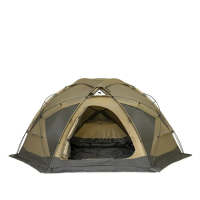Cart
The Ultimate Guide to Choosing a 1 Person Tent for Solo Adventures
Introduction:
Embarking on solo adventures in the great outdoors can be an exhilarating experience. To ensure a comfortable and secure journey, selecting the right 1 person tent is paramount. With a plethora of options available, it's essential to make an informed decision based on your specific needs and the demands of your solo excursions. In this comprehensive guide, we will explore the key factors to consider when choosing a 1 person tent, providing you with the knowledge to make a well-informed purchase.
Section 1: Understanding Your Solo Camping Needs
When selecting a 1 person tent, it's important to assess your individual camping requirements. Consider factors such as the camping location, seasonality, and weather conditions you are likely to encounter. Are you planning overnight hikes in the mountains, or perhaps solo backpacking through diverse terrains? Understanding your specific needs will help you narrow down the features and characteristics necessary for your tent.
Section 2: Tent Capacity and Space Optimization
Although labeled as a 1 person tent, it's crucial to consider the desired space and comfort level you require. Keep in mind that some solo adventurers prefer a more spacious tent to accommodate gear or allow room for movement. Look for tents that offer vestibules or additional storage options to optimize space and keep your belongings protected.
Section 3: Weight and Portability
As a solo adventurer, you'll likely prioritize a lightweight and compact tent for ease of transport. Analyze the tent's packed weight and size, as well as its portability features such as compression sacks or stuff sacks. Opting for lightweight materials and streamlined designs will ensure your tent is easy to carry, especially during long hikes or backpacking trips.
Section 4: Weather Resistance and Durability
Solo adventures can expose you to various weather conditions, making weather resistance and durability crucial aspects to consider. Look for tents constructed with high-quality waterproof materials and robust seams to keep you dry during rainstorms. Additionally, tents with sturdy pole structures and reinforced fabrics offer better resistance against strong winds and potential wear and tear.
At POMOLY Find the Best Camping Gear for You
Section 5: Easy Setup and Solo-Friendly Features
For solo campers, setting up the tent alone should be a straightforward process. Look for tents with intuitive designs, color-coded poles, and clear instructions. Freestanding tents provide the convenience of easy setup and the flexibility to move the tent if needed. Additionally, features like quick-clips, fast-pitch systems, and easy-to-use zippers can significantly enhance the overall user experience.
Section 6: Ventilation and Condensation Management
Proper ventilation is crucial to prevent condensation buildup inside the tent. Look for tents with mesh panels, adjustable vents, and rainfly options that allow for increased airflow without compromising protection from the elements. Adequate ventilation not only reduces condensation but also enhances comfort during warmer weather conditions.
Section 7: Tent Price and Value for Money
Consider your budget when selecting a 1 person tent, but also evaluate the value for money. While it's tempting to opt for the most affordable option, compromising on quality and essential features can lead to discomfort and potential issues during your solo adventures. Look for tents that strike a balance between cost, durability, and the features that align with your camping needs.
Section 8: Customer Reviews and Recommendations
Before finalizing your purchase, take the time to read customer reviews and recommendations. Gain insights from fellow solo adventurers who have already tested the tents you are considering. Pay attention to feedback on durability, ease of setup, weather resistance, and overall user satisfaction. Their experiences can provide valuable guidance in making an informed decision.
Conclusion:
- Contact Us
-

About Pomoly
Pomoly is a leading camping brand specializing in hot tents and tent stoves. We are camping life explorer, Follow Page / Join Group, let's make camping enjoyful together!
Working Hours
Mon-Fri, 09:00 - 17:00

- Company Info
- NEWS
- About us
- Pomoly Name
- Leave-No-Trace
- Contact Now
- Facebook Group
- YouTube Learning
- Product News
- Contact Us
- Topic Collections
- Policies & Terms
- Payment Policy
- Shipping Policy
- Return & Refund
- Privacy Policy
- Terms of Use
- Tax Policy
- Website Disclaimer
- Safety Disclaimer
- Warranty Policy
- Promotion Policy
- Pre-order Policy
- INTELLECTUAL PROPERTY RIGHTS
- Dealers Agreement And Terms
- Become Affiliate
- User Center
- Forget Password
- My Orders
- Tracking Order
- My Account
- Register
- Popular Searches
-
Tipi Tents Dome Tents Camping Tent Hammock Stove Camping Camping Pellet Stove Circle 6 Titanium Water TankDome X Locomotive 20 LEO 2 camping tent T-Brick 2.0 T1 2.0 tent stove Dweller wood stove Oroqen 2.0 Chimney Water Tank Lumberjack STOVEHUT Bromance 70 Tipi Pomoly Coupon Baker Oven Stove Titanium elbow Fire Pits Tent Stove titanium Stove Outdoor Pellet Stove
keebon pellet stove






